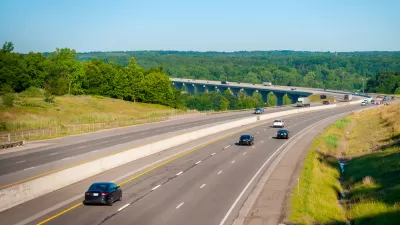The nation's third lowest gas tax will likely see a 10-cent gas tax hike—with or without Gov. Nikki Haley's signature, who insists on a larger income tax reduction than in the bill that overwhelmingly passed the House and is now in the Senate.
"The real fight [April 15] was over the income tax cut and not the road funding," writes Stephanie Coueignoux and states in the accompanying news video. "Gov. Nikki R. Haley and some Republicans want a bigger income tax cut" than the $48 savings the House agreed to.
Haley has already indicated she agreed to a 10-cent gas tax increase "only if lawmakers also reduce the income tax rate from 7 to 5 percent and also scrap the current system for a highway commission," wrote Tim Smith for The Greenville News in March.
Two amendments were proposed in the House to increase the income tax cut, but they were easily defeated. "All the lawmakers speaking against them were Republicans who said the state simply ignored roads for so long that it can't afford to both improve highways and give taxpayers money back," writes Coueignoux.
A 10-cent gas tax increase would yield $400 million annually, just over half of what a March Senate panel had agreed to in a "20 cents over five years and to index it for inflation," added Smith, resulting in a $700 million increase annually.
The House vote on April 15 is veto-proof, and it would appear that the Senate wants a higher gas tax than 10-cents and/or more revenue mechanisms to meet the "$1.4 billion more a year to bring the state's roads and bridges to good condition" according to state's highway commission, wrote Smith.
Speaking in support of raising the gas tax was M. Jack Sanders, "(t)he chief executive of Sonoco, the state’s largest home-based company, (who) said the state’s poor roads will stall industrial recruitment and cause existing companies to expand elsewhere," writes Jeff Wilkinson of The State on April 21.
Sonoco estimates that poor roads cost the global packaging giant up to $5 million annually in increased maintenance to its trucks as well as driving farther to avoid bad South Carolina roads.
The 16.75-cents gas tax was last raised over a generation ago in 1989. Only Alaska and New Jersey have lower gas taxes, according to the American Petroleum Institute as of April 1 [PDF]. The average state gas tax is 28.14-cents.
As was just seen in Idaho's seven-cent gas tax increase, and Alaska's tax increase, if only .95 cents, South Carolina is a Republican state government trifecta, i.e., three positions of state government are controlled by Republicans, so the struggle to increase the gas tax is not a partisan issue.
The last day of the South Carolina legislative season is June 4.
As noted in the recent post about neighboring North Carolina passing legislation to reduce the size of their required gas tax cut resulting from lower oil prices, South Carolina's lower gas prices added to the difficulty of raising or stabilizing gas taxes in the Tar Heel State.
The Associated Press contributed to the WSOC report.
Hat tip: AASHTO Journal
FULL STORY: SC House approves bill that would raise gas tax by 10 cents

Alabama: Trump Terminates Settlements for Black Communities Harmed By Raw Sewage
Trump deemed the landmark civil rights agreement “illegal DEI and environmental justice policy.”

Study: Maui’s Plan to Convert Vacation Rentals to Long-Term Housing Could Cause Nearly $1 Billion Economic Loss
The plan would reduce visitor accommodation by 25% resulting in 1,900 jobs lost.

Planetizen Federal Action Tracker
A weekly monitor of how Trump’s orders and actions are impacting planners and planning in America.

Wind Energy on the Rise Despite Federal Policy Reversal
The Trump administration is revoking federal support for renewable energy, but demand for new projects continues unabated.

Passengers Flock to Caltrain After Electrification
The new electric trains are running faster and more reliably, leading to strong ridership growth on the Bay Area rail system.

Texas Churches Rally Behind ‘Yes in God’s Back Yard’ Legislation
Religious leaders want the state to reduce zoning regulations to streamline leasing church-owned land to housing developers.
Urban Design for Planners 1: Software Tools
This six-course series explores essential urban design concepts using open source software and equips planners with the tools they need to participate fully in the urban design process.
Planning for Universal Design
Learn the tools for implementing Universal Design in planning regulations.
Caltrans
Smith Gee Studio
Institute for Housing and Urban Development Studies (IHS)
City of Grandview
Harvard GSD Executive Education
Toledo-Lucas County Plan Commissions
Salt Lake City
NYU Wagner Graduate School of Public Service




























